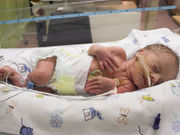But, respiratory morbidity at age one year is reduced in surfactant-treated infants
MONDAY, Feb. 29, 2016 (HealthDay News) — Late administration of surfactant does not reduce the duration of ventilation in very preterm neonates with prolonged respiratory distress, according to research published online Feb. 29 in JAMA Pediatrics.
Jean-Michel Hascoët, M.D., of Université de Lorraine in France, and colleagues conducted a double-blind, randomized clinical trial in which 118 neonates, born at less than 33 weeks of gestation, who still needed mechanical ventilation on day 14, were randomly assigned to receive poractant alfa (surfactant) or air. The effect of late surfactant on ventilation duration and respiratory outcomes at 36 weeks’ postmenstrual age and at one year postnatal age was examined.
The researchers found that the fraction of inspired oxygen requirements dropped in the surfactant group, but not in the air group, for up to 24 hours after instillation (0.36 versus 0.43; P < 0.005). The combined rate of severe bronchopulmonary dysplasia or death at 36 weeks’ postmenstrual age did not differ significantly between the groups (27.1 and 35.6 percent, respectively; P = 0.32). After discharge, fewer surfactant-treated infants needed rehospitalization for respiratory problems (28.3 versus 51.1 percent; P = 0.03); 39.5 and 50 percent, respectively, needed respiratory physical therapy (P = 0.35).
“Late surfactant administration did not alter the early course of bronchopulmonary dysplasia,” the authors write. “However, surfactant-treated infants had reduced respiratory morbidity prior to 1 year of age.”
Copyright © 2016 HealthDay. All rights reserved.








